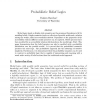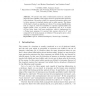1027 search results - page 8 / 206 » Representing and Reasoning with Operational Semantics |
FUZZIEEE
2007
IEEE
13 years 11 months ago
2007
IEEE
An ordinal fuzzy linguistic Information Retrieval System (IRS) based on a multi-level weighting scheme to represent the user queries, in a more flexible way, is proposed. The IRS a...
PSSS
2003
13 years 8 months ago
2003
: RDF-based tools promise to provide a base for reasoning about metadata and about situated data—data describing entities situated in time and space—that is superior to alterna...
ECAI
1990
Springer
13 years 11 months ago
1990
Springer
Modal logics based on Kripke style semantics are the prominent formalismin AI for modeling beliefs. Kripke semantics involve a collection of possible worlds and a relation among t...
ISMIS
1994
Springer
13 years 11 months ago
1994
Springer
We assume that safety of information stored in a database depends on the reliability of the agents who have performed the insertions in the database. We present a logic S to repres...
CSL
1999
Springer
13 years 11 months ago
1999
Springer
Abstract. This paper represents the beginning of a study aimed at devising semantic models for true concurrency that provide clear distinctions between concurrency, parallelism and...


